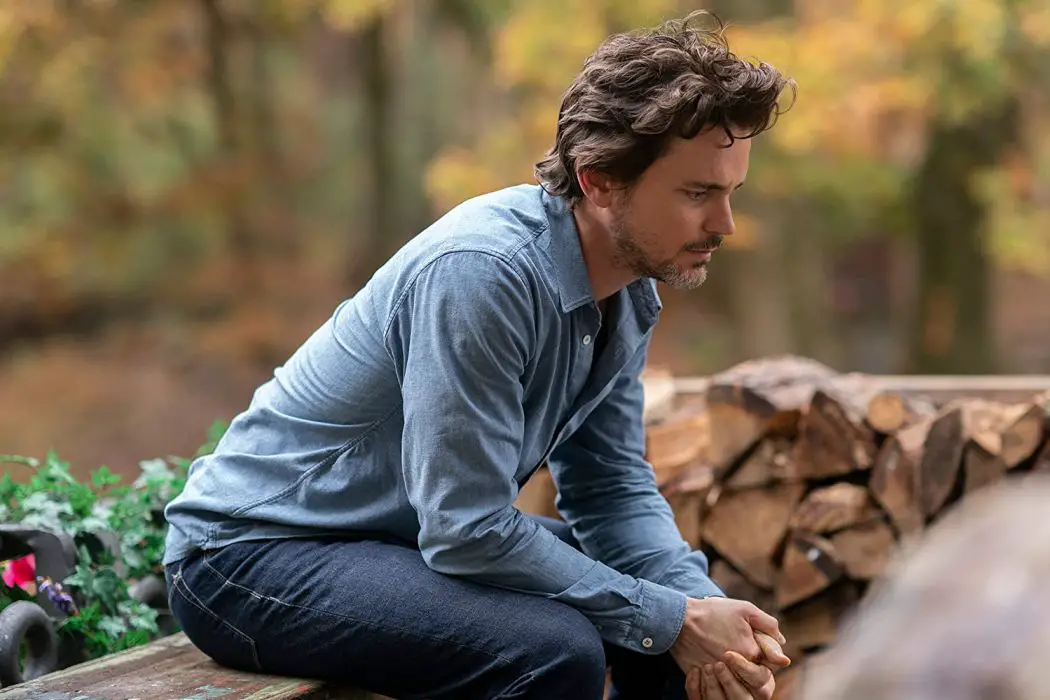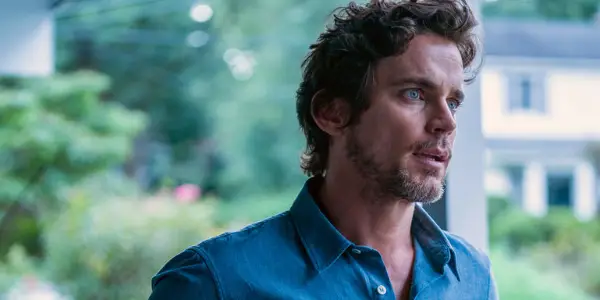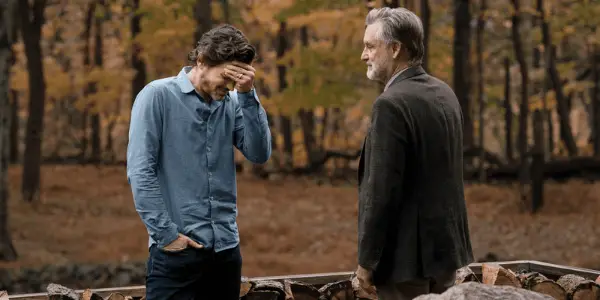THE SINNER Season 3: Articulating Male Vulnerability

Reyzando Nawara is a passionate film and TV enthusiast from…
When it first debuted in 2017, The Sinner, an intriguing crime mystery developed by Derek Simonds and executive-produced by Jessica Biel, looked just like another crime procedural drama where a detective is investigating a murder in a suburb. But as the show goes on, The Sinner quickly evolves into a compelling study that examines the characters’ psychology. For three seasons, the show never asks who kills who — that’s immediately answered in the pilot of each season. Instead, what The Sinner truly excels at is unveiling the reason why do the murderers did what they do in the first place.
Each season features a different mystery and a new set of characters. The only connecting tissue is a character named Detective Harry Ambrose (Bill Pullman). But unlike any other detectives that we often see in other similar shows, Ambrose isn’t portrayed as someone who always knows what to do in the investigation. He is, in fact, a very flawed and vulnerable character, one whose method is at times questionable. Yet because of those flaws, Ambrose is able to engage with the person he’s investigating on a much deeper level. He spends his time understanding their traumas rather than trying to learn about their motives. And this is why even though some parts are familiar to other crime mystery TV shows, the quality that Ambrose brings to the table makes The Sinner feels more refreshing and compelling.
A misconception of Nietzsche’s Übermensch
Like the two previous seasons, The Sinner season three opens with a gruesome death. But compared to Cora’s stabbing on the first season or Julian’s poisoning on season two, this time feels a little mundane. It’s a car crash. And the victim is a man named Nick Haas (Chris Messina). The man on the passenger seat survives the crash, and his name is Jamie Burns (Matt Bomer). At first, it looks like he’s trying to help Nick by calling 911. But Ambrose has another theory. He thinks that there’s something odd about the accident. And it turns out that his theory is not wrong. Apparently, Jamie decides to wait nearly an hour before calling 911, ensuring Nick’s death while preventing any suspicion toward him.

We don’t know what exactly happened between Jamie and Nick in the past. And the show takes its time slowly before revealing the relationship between the two. What we learn about Jamie so far is that he’s just an ordinary teacher who has a nice life and a pregnant wife named Leela (Parisa Fitz-Henley). But of course, that’s just what it looks like from the outside. Later in the second half of episode one, we learn that Jamie and Nick are college buddies. And Leela does not know anything about it until Nick appears in front of their house while Jamie and Leela are about to have dinner.
Leela assumes that his husband and Nick were a couple, or at least they experimented together while in college. But she’s got it completely wrong. Nick and Jamie’s relationship is far from romantic or sexual. It is, in fact, built on the foundation of Nietzsche’s philosophy. The problem is, Nick’s understanding of the Übermensch concept by Nietzsche is invalid and even harmful. He assumes that what the concept is trying to say is, in order to have a higher life above the other beings, you have to face death and fear no consequences of your actions.

It is indeed a very interesting concept to explore. But it’s also a heavy one. When the show spends its time delving deep into Jamie and Nick’s relationship and their understanding of that philosophy, it becomes a little repetitive. There’s no suspense. All that’s left is just talking and philosophizing. Of course, it’s totally understandable that the showrunner wants the show to be something else, but if only they know how to bring this philosophical talk into the suspenseful element of the show, the season will be much more appealing. Still, even when things begin to grow heavier, Bomer’s performance remains engaging. He’s able to display Nick’s inner wound using only subtle body gestures while still managing to be charming. It’s easily the best performance of his career.
Deconstructing masculinity
Throughout the season, it’s easy to blame Nick and his misconception about what happens to Jamie. But Jamie’s not blameless either. His fault is he never challenges Nick’s perspective. He instead just goes along with it because he’s already too drawn by Nick’s charms. As a result, he bottles up his fear in favor of a toxic relationship. And even after years of not seeing Nick, the fear and trauma that he’s been hiding ever since he met Nick are still there inside of him because he never has a chance or a desire to let it all go. The minute Nick reappears into his life, those feelings that have been simmering within him begin to mess him and his life up. Jamie eventually tries to kill those feelings by letting Nick dead. But of course, it can’t be that easy.
When you’ve been containing a lot of feelings inside you, the only way you can be released from it is by letting it all go, not keeping it hidden. As the show illustrates from Jamie, bottling up our emotions is a danger to us and our surroundings. We shouldn’t be afraid of communicating our feelings regardless of how painful it is. Jamie’s fault is not realizing it sooner. He assumes that because he’s a man and a husband who’s about to be a father, articulating his feelings will only make him look weak.

This theme of toxic masculinity isn’t exactly new anymore in The Sinner. In fact, in the first two seasons, the show has explored this subject through Ambrose. Much like Jamie, Ambrose is someone who chooses to bottle up his feelings instead of doing something about it. He has experienced childhood trauma. But the difference between the two is, unlike Jamie who refuses to acknowledge that there’s something wrong with him, Ambrose is aware of what happens to him. He keeps his family at arm’s length because he’s afraid if he’s close to them, the feelings that he hides within him will take control of him and make him dangerous just like what Jamie does to so many people throughout the season.
Though the second half of season three is still a little frustrating, the show’s exploration of the similarity between Jamie and Ambrose is interesting to witness. Ambrose is able to understand Nick like no one else because he sees parts of himself in Jamie. The same also goes for Jamie. He keeps coming back to Ambrose because he’s trying to understand himself and his emotions from Ambrose. But when Ambrose offers Nick some help, he refuses because he still doesn’t understand what happens to him or the danger he inflicts upon his surroundings.
What this season teaches us
Until the last minute of season three, the show doesn’t try to explain what exactly Jamie is experiencing nor does it try to offer any solutions to it. But that’s exactly what makes Jamie’s last-minute on the season even more tragic. Jamie is struggling to understand his feelings until the very end. And worse, he refuses to even try to do something about it. Of course, some feelings are just hard to articulate, but it doesn’t mean that we shouldn’t try to do so. We gotta start somewhere if we don’t want to end up like Jamie.
This season of The Sinner is nowhere near the two previous seasons. Most of the suspense is sacrificed in favor of more serious subjects. And the first half of the season feels like it’s just running in a circle. But in the end, when the show digs deep into its examination of masculinity and male emotions, The Sinner remains a standout like no other crime show on TV right now.
What do you think of the ending? Let us know in the comments!
The Sinner season three is available to watch on USA Network app.
Does content like this matter to you?
Become a Member and support film journalism. Unlock access to all of Film Inquiry`s great articles. Join a community of like-minded readers who are passionate about cinema - get access to our private members Network, give back to independent filmmakers, and more.
Reyzando Nawara is a passionate film and TV enthusiast from Indonesia. When he's not watching TV and movies, he likes to cook and make sorbet.













